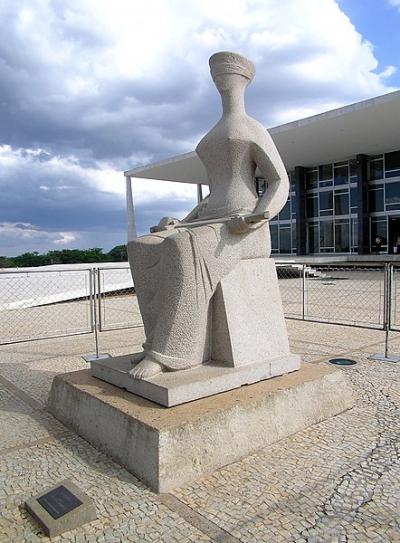All Souls Blog: Victims of Domestic Violence and Restorative Justice: Some Notes from the ‘Periphery’ to the ‘World Centres’
Professor Fernanda Fonseca Rosenblatt is a professor of Law at the Catholic University of Pernambuco in Brazil. She is well known to the Oxford Centre for Criminology, having completed her DPhil under the supervision of Professor Carolyn Hoyle in 2014, and is a prominent voice in scholarship on restorative justice in the Brazilian context and beyond. Professor Rosenblatt presented her recent research at the second All Souls Criminology Seminar of Michaelmas 2020, sharing particular insights from a larger project commissioned by Brazil’s National Council of Justice. The study aimed to understand how Brazil’s domestic violence courts currently operate, more than a decade after their creation, as well as the experiences of the women going through this process. The research comprised qualitative and quantitative components, including semi-structured interviews with victims of domestic violence, and was carried out in collaboration with over 50 academics across 6 Brazilian cities. Professor Rosenblatt outlined the socioeconomic profile of these women and exposed the gulf between their needs and expectations, and the realities they face in the domestic violence court process. Using the findings of her research as a foundation, Professor Rosenblatt concluded by reflecting on the potential to implement restorative justice practices into the Brazilian justice system, in an effort to reduce the excessive harm caused to both victims and offenders as a result of an overly punitive, reductive, criminal-legal approach.
Posted:
Time to read:
Victims in Brazil’s Domestic Violence Courts: Who Goes Through the System and Why?
Professor Rosenblatt stressed that the overall profile of the women whose cases end up in the court system is not representative of the larger picture of victims of domestic violence overall. Rather, the women whose conflicts are brought into the criminal legal system are those who see no option to break the cycle of violence other than to seek help at a women’s police station—the only ‘care service’ they have access to—where their conflicts will then be drawn into the retributive-punitive criminal process. These women are mostly poor women of colour, who are employed informally or in low-wage work. The majority of them have very little formal education, and most of those who report abuse are in long-term relationships with partners with whom they have children. As Professor Rosenblatt pointed out, then, these women do not reflect the ‘Maria de Penha’ of the eponymous 2006 legislation that led to the establishment of these domestic violence courts.

Desires, Expectations, and Realities: Victims’ Experiences of the Domestic Violence Courts
The study also sought answers to two key questions: firstly, what do victims going through this system want? And secondly, what do they actually get? Fundamentally, Professor Rosenblatt explained, these women simply want to break the cycle of violence. They rarely seek harsh punishments (such as imprisonment), and prefer protective measures (for example, restraining orders). When protective measures work effectively and according to the desires of the victim, continuing with criminal-legal proceedings not only becomes pointless, but adds another layer of victimisation to the conflict: the burden of the legal process results in secondary victimisation as these women become victims of the criminal justice system itself. This is then compounded by the specific socioeconomic profile of the victims, leading to further difficulties relating to personal finances, transportation, childcare, and potential loss of employment. In Brazil, the protective measures frequently sought by victims of domestic violence are conditional on the existence of a criminal prosecution case. If criminal charges are dropped, the protective measures will also cease. The state, therefore, only protects women on their own terms when it is also allowed to pursue punitive measures that often go directly against victims’ wishes. It is important, Professor Rosenblatt noted, to challenge simplistic ideas about what ‘justice’ means in domestic violence cases; for example, by exploring the problems posed by mandatory arrest and prosecution policies, dispelling the myth of the vengeful victim, and, crucially, acknowledging that victims have justice needs other than punishment. Indeed, the participants in the study frequently expressed feelings of a lack of interactional, informational, and procedural justice and had little overall understanding of the legal processes they were implicated in. Professor Rosenblatt also highlighted the fact that despite these courts’ ostensible speciality, the judges presiding over these cases were strikingly ill-equipped to deal with them. Judges often had no expertise or training in issues of gender or domestic violence, and moreover, Professor Rosenblatt described an ‘active, almost militant form of sexism’ entrenched in the entire legal system—explaining how deeply-held misogynistic attitudes even affected the women researchers working on the project.

Reflecting on Ways Forward for Restorative Justice in the Brazilian Context
Professor Rosenblatt finished by considering the feasibility as well as the potential risks and benefits of implementing restorative justice in the domestic violence courts. She concluded that restorative justice can and should be integrated into the process, to allow victims to have their wishes and concerns recognised and to reduce the secondary victimisation caused by the system as it currently functions. The informal, dialogical nature of restorative justice conferences allows discussion to flow within a pre-defined safe space, and enables underlying conflicts to come to the surface and to be addressed. While it is only through restorative justice practices that courts will be able to work on a sensitive, case-by-case basis, rather than in broad strokes that rarely effect ‘justice’ for either party, Professor Rosenblatt emphasised the need for nuance, understanding, and an unhurried, prepared, expert approach that could go beyond, in the words of one interviewee, ‘copy and paste’ solutions. Brazil cannot afford, Professor Rosenblatt contended, for these practices to be co-opted by the state for punitive purposes or merely as a cosmetic reform. Restorative justice, therefore, must be accompanied by an effort to transform the penal system by reducing incarceration rates, adequate and frequent training for those working in the system, experienced mediators and facilitators, and well-informed, well-prepared, well-protected parties whose voices are heard and respected, and complex needs addressed.

Keywords:
Share:
